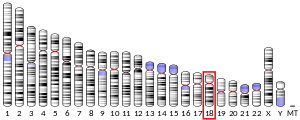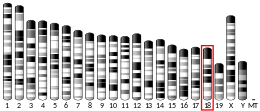From Wikipedia, the free encyclopedia
Protein found in humans
Zinc finger protein 521 is a protein that in humans is encoded by the ZNF521 gene .[ 5]
La Rocca R, Fulciniti M, Lakshmikanth T, Mesuraca M, Ali TH, Mazzei V, Amodio N, Catalano L, Rotoli B, Ouerfelli O, Grieco M, Gulletta E, Bond HM, Morrone G, Ferrone S, Carbone E (April 2009). "Early hematopoietic zinc finger protein prevents tumor cell recognition by natural killer cells" . Journal of Immunology . 182 (8): 4529– 37. doi :10.4049/jimmunol.0802109 . PMC 2747523 PMID 19342626 . Bond HM, Mesuraca M, Amodio N, Mega T, Agosti V, Fanello D, Pelaggi D, Bullinger L, Grieco M, Moore MA, Venuta S, Morrone G (2008). "Early hematopoietic zinc finger protein-zinc finger protein 521: a candidate regulator of diverse immature cells". The International Journal of Biochemistry & Cell Biology . 40 (5): 848– 54. doi :10.1016/j.biocel.2007.04.006 . PMID 17543573 . Warming S, Liu P, Suzuki T, Akagi K, Lindtner S, Pavlakis GN, Jenkins NA, Copeland NG (March 2003). "Evi3, a common retroviral integration site in murine B-cell lymphoma, encodes an EBFAZ-related Krüppel-like zinc finger protein" . Blood . 101 (5): 1934– 40. doi :10.1182/blood-2002-08-2652 PMID 12393497 . Matsubara E, Sakai I, Yamanouchi J, Fujiwara H, Yakushijin Y, Hato T, Shigemoto K, Yasukawa M (February 2009). "The role of zinc finger protein 521/early hematopoietic zinc finger protein in erythroid cell differentiation" . The Journal of Biological Chemistry . 284 (6): 3480– 7. doi :10.1074/jbc.M805874200 PMID 19049973 . Bond HM, Mesuraca M, Carbone E, Bonelli P, Agosti V, Amodio N, De Rosa G, Di Nicola M, Gianni AM, Moore MA, Hata A, Grieco M, Morrone G, Venuta S (March 2004). "Early hematopoietic zinc finger protein (EHZF), the human homolog to mouse Evi3, is highly expressed in primitive human hematopoietic cells" . Blood . 103 (6): 2062– 70. doi :10.1182/blood-2003-07-2388 PMID 14630787 . McCormack M, Urban TJ, Shianna KV, Walley N, Pandolfo M, Depondt C, Chaila E, O'Conner GD, Kasperavičiūtė D, Radtke RA, Heinzen EL, Sisodiya SM, Delanty N, Cavalleri GL (March 2012). "Genome-wide mapping for clinically relevant predictors of lamotrigine- and phenytoin-induced hypersensitivity reactions" . Pharmacogenomics . 13 (4): 399– 405. doi :10.2217/pgs.11.165 . PMC 3428903 PMID 22379998 . Hesse E, Kiviranta R, Wu M, Saito H, Yamana K, Correa D, Atfi A, Baron R (March 2010). "Zinc finger protein 521, a new player in bone formation". Annals of the New York Academy of Sciences . 1192 (1): 32– 7. Bibcode :2010NYASA1192...32H . doi :10.1111/j.1749-6632.2009.05347.x . PMID 20392215 . S2CID 29853724 . Tchernev VT, Mansfield TA, Giot L, Kumar AM, Nandabalan K, Li Y, Mishra VS, Detter JC, Rothberg JM, Wallace MR, Southwick FS, Kingsmore SF (January 2002). "The Chediak-Higashi protein interacts with SNARE complex and signal transduction proteins" . Molecular Medicine . 8 (1): 56– 64. doi :10.1007/BF03402003 . PMC 2039936 PMID 11984006 . Spina R, Filocamo G, Iaccino E, Scicchitano S, Lupia M, Chiarella E, Mega T, Bernaudo F, Pelaggi D, Mesuraca M, Pazzaglia S, Semenkow S, Bar EE, Kool M, Pfister S, Bond HM, Eberhart CG, Steinkühler C, Morrone G (August 2013). "Critical role of zinc finger protein 521 in the control of growth, clonogenicity and tumorigenic potential of medulloblastoma cells" . Oncotarget . 4 (8): 1280– 92. doi :10.18632/oncotarget.1176 . PMC 3787157 PMID 23907569 .




